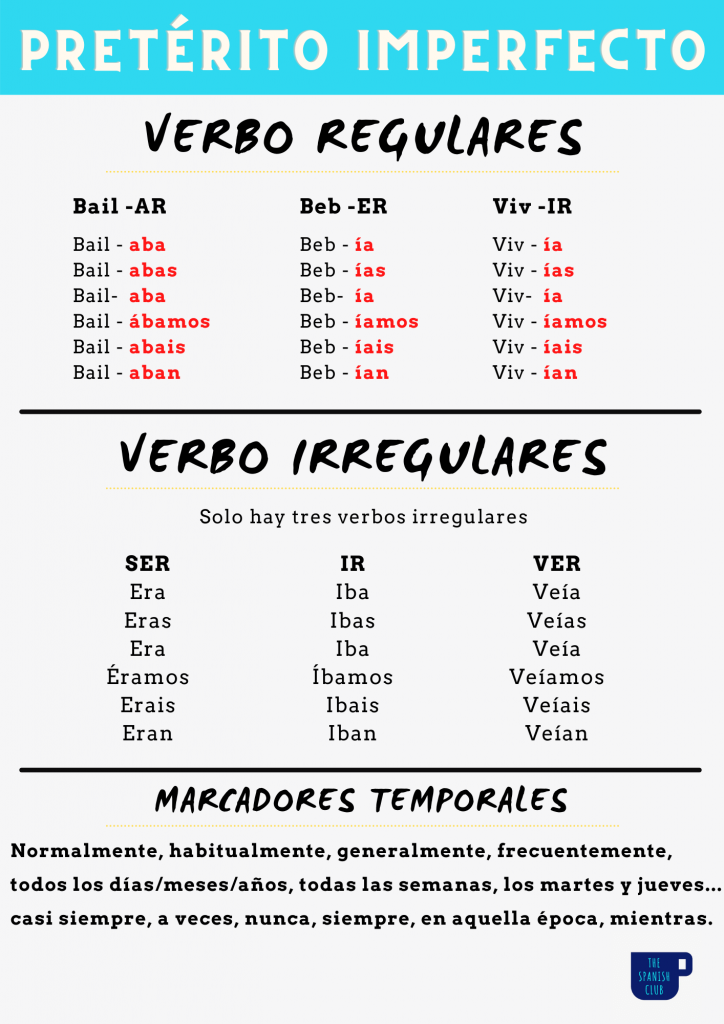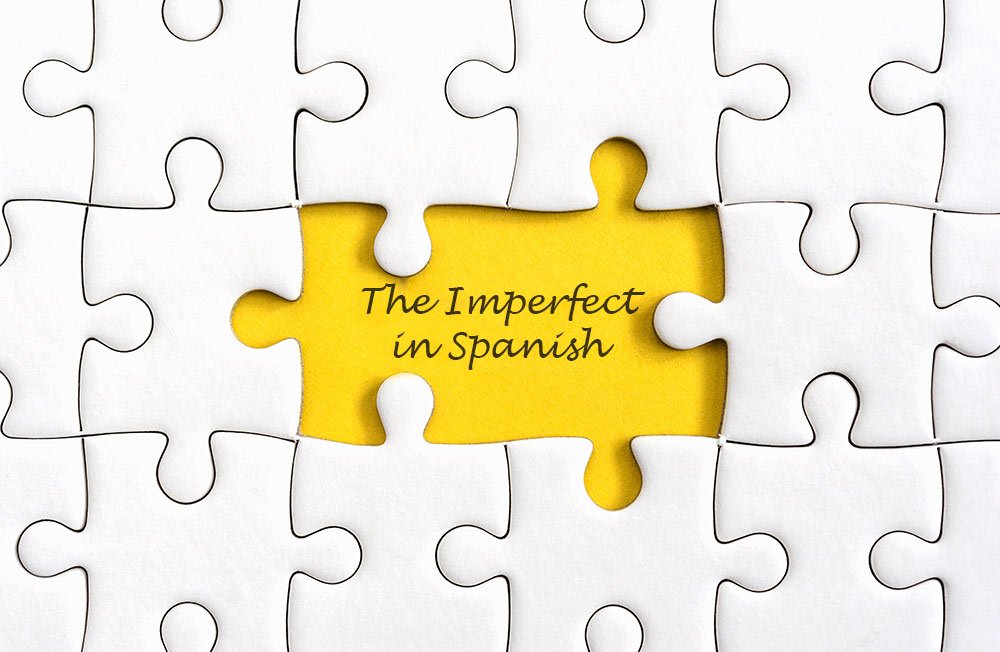Have you heard of the imperfect tense in Spanish? This is another of the spanish past tenses that we are going to learn, the Imperfect Tense (Pretérito Imperfecto). We like this Spanish past tense very much because it has only three irregular verbs! Furthermore, the regular form of its verbs is very easy to remember.
In addition, the usual time expressions we use in the Spanish imperfect tense (Pretérito Imperfecto de Indicativo are): Normalmente (Normally), habitualmente (usually), generalmente (generally), todos los días/meses/años (every day/month/year), todas las semanas (every week), los lunes y miércoles (on Mondays and Wednesdays) …, casi siempre (almost always), a veces (sometimes), nunca (never), siempre (always), en aquella época (at that time), mientras (while).
As you can see, the imperfect tense in Spanish its quite straightforward. Today, in the SpanishClub, we will learn the ways to use this Spanish past tense and how to identify it.
Imperfect Tense in Spanish: When to use
There are many situations when you much use the imperfect tense in Spanish. Here you have the most common ones.
1. Describing people, things, places, or animals in the past.
Mi abuela tenía el pelo blanco y vivía en Barcelona. (My grandmother had white hair and lived in Barcelona.)
2. To describe a physical or mental condition.
Era soltero y estaba contento con su vida. (He was single and content with his life.)
3. To make other descriptions such as time, date and age.
Eran las cinco de la tarde. (It was five o’clock in the afternoon.)
Era 2018 y tenía cuarenta y cinco años. (It was 2018 and I was forty-five years old.)
4. Expressing actions carried out habitually in the past.
En otoño, todas las mañanas llovía en París. (In autumn, it rained every morning in Paris.)
5. Showing a past action that is interrupted by another action.
Preparaba la cena cuando llamarón por teléfono. (I was preparing dinner when the phone rang.)
6. To recount a past action taking place simultaneously with another action.
Estudiaba en la universidad mientras trabajaba de camarera. (She studied at university while working as a waitress.)
7. In order to express politeness in the present tense, we use the verbs: querer, poder, desear in the imperfect past tense.
¿Qué deseaba de postre? Sí, por favor, quería una tarta de queso, gracias. (What would you like for dessert? Yes, please, I would like a cheesecake, thank you.)
8. To express change: before/now.
Antes cuando era pequeño era muy tímido, pero ahora soy muy sociable. (I used to be very shy when I was little, but now I am very sociable.)
9. To express a future in relation to a past (indirect style).
Dice que quiere ir de vacaciones a Venecia. (He says he wants to go on holiday to Venice.)
Dijo que quería ir de vacaciones a Venecia. (He said he wanted to go on holiday to Venice.)
10. Expressing intention. It refers to the past and did not occur.
Ayer quería ir al cine, pero estaba cansada y me quedé en casa. (Yesterday I wanted to go to the cinema, but I was tired and stayed at home.)
11. To ask for forgotten information.
¿Cómo te llamabas? Perdona, he olvidado tu nombre. (What was your name again? Sorry, I forgot your name.)
12. Co-present. It is the relationship of two actions that coincide in the past. The action of the subordinate clause affects or causes the action of the main clause.
Ayer no fui al gimnasio porque me dolía la cabeza. (I didn’t go to the gym yesterday because I had a headache.)

Spanish Homework
Now we are going to practise with the following exercise and you are going to check what you have learned. Read the following text and tell us what you liked to do when you were a child.
“Cuando era pequeña iba todos los lunes a clase de baile, me gustaba mucho bailar. Bailaba siempre que podía. Vivía con mis padres en una casa en el campo. Iba a una escuela de la ciudad y estudiaba mucho para tener tiempo libre los fines de semana”.
Now correct the following errors that appear in the following sentences.
- Fueron/eran las tres de la tarde cuando comenzó a llover.
- Anoche mientras cené/cenaba una tortilla de patata, hablaba/hablé con mis amigas.
- La semana pasada cuando caminaban/caminaron por la Plaza Mayor, se encontraban/encontraron con su profesor de literatura.
- Disculpa, ¿Tu abuelo era/fue el Doctor Sánchez?
- Por favor, queríamos/quisimos un chocolate con churros. Gracias.
- El mes pasado iba/fui todas las tardes a la biblioteca porque tenía muchos exámenes.
- El verano pasado quería/quise viajar a Portugal, pero las fronteras estaban cerradas por la pandemia.
Send us your answers to our email or Whatsapp. Also, you can also create new examples, we will check them and will be happy to correct them. We look forward to hearing from you. In addition to this, in the Spanish Club we are always willing to help everyone to learn spanish online. Get in touch with us if you need help in learning spanish.

